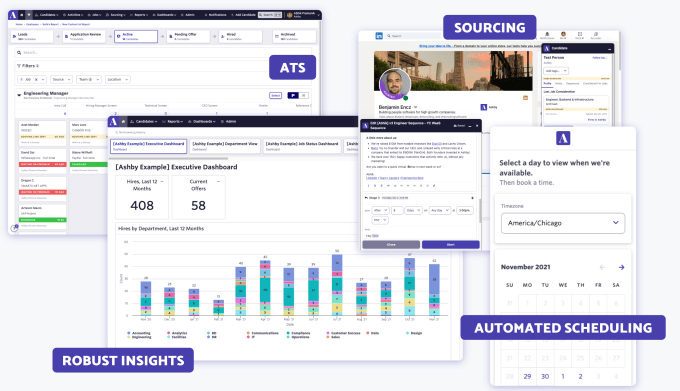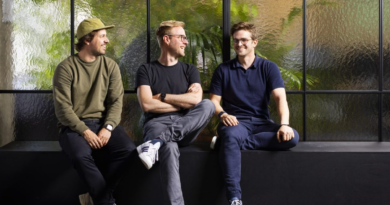Ashby injects recruiting with a dose of AI
Benjamin Encz and Abhik Pramanik’s paths to entrepreneurship were long and unusual.
Having previously worked as an R&D engineer at FX companies Industrial Light & Magic and DreamWorks on films like “Transformers” and “How to Train Your Dragon,” Pramanik left the film industry in 2012 to join VC firm Social Capital as an engineer in residence. There, he co-founded Choir, a mental health app for iOS. Several years later, Pramanik was hired at PlanGrid, a construction productivity software startup, as a senior product manager, where he met Encz.
At PlanGrid, much of Encz’s time was taken up by recruitment. (He previously worked at IBM in a rotational program before moving to Datagroup, a consulting firm.) It’s at PlanGrid that Encz, the director of engineering, became acquainted with the hiring processes’ pain points.
“The industry has gone from companies rapidly growing headcount to suddenly retracting, changing the dynamic of the talent market and how talent acquisition teams need to adjust,” Encz told TechCrunch. “The pain is felt all the way at the top, with executives citing talent as the number one topic, making them uneasy.”
As a remedy for this “pain,” Pramanik and Encz launched Ashby, a platform that consolidates existing talent acquisition tools and leans heavily on AI to automate the more repetitive steps in the recruitment pipeline. Ashby can help create job listings, source candidates and send calendar invites for interviews while delivering dashboards with real-time hiring metrics to stakeholders.
“As hiring managers and leadership team members ourselves, we know how difficult it has historically been for employees outside a recruiting team to have a positive experience with an applicant tracking system (ATS),” Encz said. “Ashby was built with all stakeholders in mind, as we believe talent is the most important element for a company to be aligned on for growth.”
One of Ashby’s AI capabilities, AI-generated filters for candidate search, lets recruiters describe in plain language which kind of candidates they’re searching for in an applicant database (e.g. “Candidates with Python skills who we hired this year who didn’t come from referrals”) and have Ashby write the necessary filter logic and booleans for the search query.
Ashby can also insert personalized, AI-generated copy into outreach emails by drawing on a job description and a candidate’s resume, and automatically classify responses to the emails from candidates as “interested” or “not interested.” Beyond this, the platform can summarize interview feedback collected throughout the recruitment process into debriefs for recruiters, with highlights quoting the individual interview feedback.
What if the AI makes mistakes, as AI is wont to do? Encz notes that the outputs can be tweaked or adjusted — and that human review built into each workflow.
“We view our opportunity in AI in line with our general focus on product velocity and quality,” Encz said. “Our biggest differentiation centers around the quality and accessibility of talent team data, the connectedness of workflows that comes from the system being built on a single platform versus multiple point solutions and the quality of our customer experience.”

Since emerging from stealth in September 2022, Ashby’s customer base has grown to over 1,300 brands, including Quora, Ironclad, Vanta, Reddit and Lemonade. Revenue is up 6x; Encz says that Ashby’s making most of its money through a base subscription with add-on fees for more sophisticated scheduling and analytics tools.
Investors are pleased with the numbers, it seems. This week, Ashby closed a $30 million Series C round led by Lachy Groom, with participation from tech entrepreneur Elad Gil, F-Prime and Y Combinator — bringing Ashby’s total raised to $70 million.
Encz described the Series C as a “solid up-round” from the Series B.
“We’ve seen very strong growth in the last two years and are seeing increasing growth rates across both startups and enterprise customers, making this an ideal time to double down on further product development and go-to-market investments,” he added. “This additional funding provides us with many years of runway and a lot of options.”
One of those options is expansion. Ashby plans to hire around 50 people by the end of the year, adding to its team of ~100 based in its San Francisco HQ.




